|
|
|
|
Vennus Johanna Nielsen Cluff
• Born: Colonia Juarez, Chih.,
Mexico on July 6, 1894
• Married: Archibald Carlisle Cluff - October 2, 1914
• Mother of
•
• Died 7th of July, 1960
| |
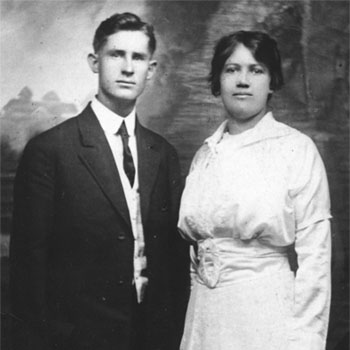
|
|
|
|
Archibald Carlisle Cluff and Vennus Johanna Nielsen Cluff
A Brief History
Preface
This is not an attempt to write a biography of Father and Mother, but to record some of the
experiences we know they had and to give some insight into the times they lived in. It is a compilation of
materials written by some of their children plus inserts written by Mother and reproduced here in her own
words. The portions written by Mother are in the first person and are indented for easy identification.
In the portions of the history written by the children, father and mother refer to Archie and
Vennus, grandpa and grandma refer to Mother's parents, Carl and Sine Nielsen, unless otherwise
indicated. In the parts written by Mother, father and mother also refer to her parents.
Mother was born in Colonia Juarez, Chih.,
Mexico on July 6, 1894. She was the third daughter
and 6th child of Carl Emil Nielsen and Sine Olene
Jensen. Grandpa and Grandma Nielsen had moved to
Mexico to escape persecution. Grandpa was a
polygamist and had two wives at that time.
Mother lived in Mexico until 1912 when
political unrest forced all Americans to leave Mexico. |
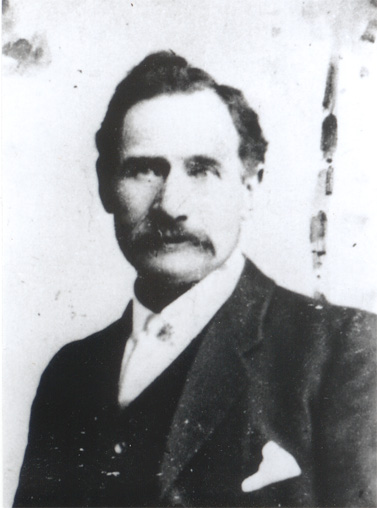 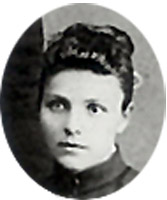 |
She lived in New Mexico a few months then moved to Arizona where she met and married Father in
1914. They continued living there until 1922 at which time they moved back to Mexico with their
growing family. Father died in 1936 and mother moved back to Arizona in 1946. She died there on July
7, 1960.
Father was born in Pima, Ariz. on
April 16, 1890. He was the third child in a
family of ten born to John Henry Cluff and
Margaret Alice Ferrin. John and Margaret
Cluff had moved from Utah to Pima to help
settle the Gila Valley. The first two children
had died as infants making Father the oldest
living child. Father's mother died in childbirth in 1904. This meant that father spent much of his youth
caring for his younger brothers and sisters. |
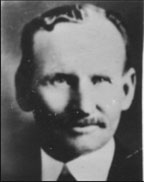 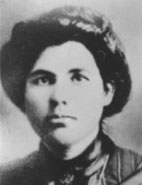 |
Father lived in Arizona, except for the two and one half years he spent in the mission field, until
he moved his little family to Mexico in 1922. He made several trips back to Arizona to visit and returned
there to seek medical attention where he died in 1936.
Memories of Vennus and Archie Cluff
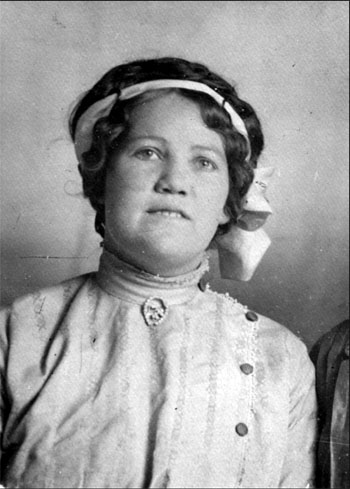 |
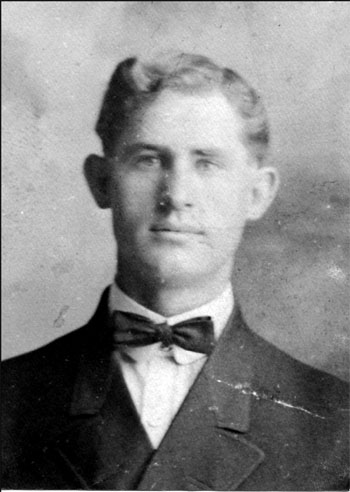 |
| |
I have been wanting to write some of my faith promoting experiences and
decided I had better get started. The Lord has been very good to me. I have felt his
presence often and know He hears and answers prayers and is ever mindful of us and
loves us dearly.
First I was born with wonderful parents who taught me the right way of life and
so lived that their lives were an inspiration to all their children. Father was so humble
and generous and kind. Mother so truthful, honest and dependable. Neither of them
could stand to see anyone suffer if in any way they could help. They would give their
last piece of bread to a hungry stray dog or cat if need be.
To begin my story, I was about 6 years old when Carl, my brother, took typhoid
fever, he was quite ill. The Elders were called in, and they administered to him. One of
the Elders then asked him how he felt. He said, “better.” The Elder then said, “Oh, you
will be pretty sick before you get much better. Typhoid fever runs at least three weeks.”
The next evening Carl was very restless again and asked for the Elders, but said “Please
don't get Bro----, the one who was here last night. He hasn't any faith that their
administration will help me.” Mother sent me after two other Elders. They came, and I'll
never forget that night. I remember it so plainly. I was sitting on a trunk in the room
where they administered to Carl, and as they prayed, every inch of my body was made to feel a heavenly influence, and I knew that Carl would get well just as much as I knew I
was there. I was only six years old, but my spirit was older, and it knew and understood
and gave me an assurance of it. Carl also knew. We both said afterward that we knew it.
I started school at the age of six, but was taken out after a few months. My father
was a millwright and cabinet maker. He was a very good carpenter and cabinetmaker,
having been taught the trade in Denmark as an apprentice. This trade took him away
from home much of the time. He had owned a grist mill in Colonia Dublan, but fire
destroyed the mill, and so he went away to work to provide for his large family. His two
wives would take turns going with him when he left for employment. This time my
mother (Sine) took her children, and went with him to Chihuahua City where he worked
for a year. From Chihuahua, he went to Ciudad Juarez, where he started a cabinet shop
for himself, making furniture. He soon found that his heart was at home, where he could
be with his entire family, and we could be with the church activities. The picture show
was very new at that time. In Ciudad Juarez we lived near an entertainment garden
where picture shows were shown twice a week. Mother ran a lunch room for men and
workers of the E.R.A.. Each evening there was entertainment, music, and band concerts.
We went back to Dublan again and to school. I hadn't been in school while we were
gone so I had to start in the first grade. I was eight yeas old.
|
Mother was baptized by her father when she was 8 years old. She was excited about being
baptized, but some of her older brothers started teasing her by telling her that they baptized people by
putting a rope around the person's neck, throwing them into the river, and dragging them out again before
they could drown. Mother said she really didn't believe her brothers, but she was concerned enough that
she went to her mother and asked her about baptism. Her mother explained everything to her and she
was satisfied. The day of her baptism came. Mother walked with her parents toward the river, passing
the bishop's house on the way. They knocked on the bishop's door and invited him to accompany them.
He said, “Oh, you're ready. Well let me get my rope.” He went back into the house, returning a few
minutes later, carrying a rope. Then Mother did begin to worry. Had her Mother not told her the truth so
as not to worry her? Mother went into the river with her Father, and was baptized in the usual way. On
the way home she asked her Mother why the bishop needed the rope. Her Mother explained that his
horses were pastured on the other side of the river, and that he was going to get them after the baptism.
At the time of Mother's baptism, the family was living in Colonia Juarez in a house built by
Grandpa Nielsen. It later was bought by Bro. John Telford, and became known as the old Telford house.
Grandpa planted a weeping willow tree in the front yard the year Mother was born. It was still there
many years after his grandchildren were grown.
| |
When I was ten years old, I had my patriarchal blessing, given by Henry
Martineau. He promised me many wonderful things if I lived to the best of my ability. He
told me to choose a husband who loved the Lord and his work. This I did.
[Webmaster's Note: Vennus' patriarchal blessing was shared in this part of the history but has been omitted in the web version. Please contact a member of the family for the full version]
I graduated from the eighth grade in 1909. Not being able to go away to school, I
stayed in Garcia with John Bingham and wife Pearl where I attended the eighth grade
again. |
Mother was 17 or 18 years of age at the time of the Mormon Exodus from Mexico. This exodus
took place in the 1912.
Pancho Villa, a revolutionary, had asked the U.S. Government for arms so that he could
overthrow the Mexican government which was under the leadership of President Carranza. U.S.
officials refused his request, so he threatened to kill all Americans living in Mexico. The U.S.
Government sent trains to Pearson, the nearest railroad station to the colonies, to evacuate the Americans
living there. The American women were all sent to El Paso or to other parts of the U.S..
Grandpa Nielsen was working at the lumber mill at Madera when this happened. The mill was
one of the largest lumber mills in the world at that time. Grandpa was a millwright there.
Grandma Nielsen was planning a new home. Glass and paint had been purchased. The family
dug a hole and buried the paint and glass in it. When they returned after the exodus, they found that
someone had discovered their hiding place. The glass was broken and the paint was gone. Mother tells
about some of the experiences she and her family had:
| |
I left school in February and went to El Paso with Mother where we lived until the
following May. We decided things were safe in the Mormon Colonies in Mexico (Madera
was not a Mormon colony). We went back to the Colonies, but were only there two months
when everyone left and came to the U.S.. It was quite an experience. Of course for us young
folks it wasn't too bad, but for our parents it must have been a very sad and hard experience.
We were told that we had just a few hours to get ready and could take only one trunk per
family. Things hadn't been too bad in Garcia until now. Although several groups of soldiers
and red flagers had passed through town, they had all been reasonable. They had to be fed
and given food, but mostly they had paid for what they got. I remember as one large groupcame through my mother baked hot bread as fast as she could with two ovens until she had
baked a hundred pounds of flour up in bread. I helped, but I was kept out of sight because I
was a young lady, and Mother thought it safer for me if I wasn't seen by those men. She was
very anxious over me and her other children. More so over me at that time because I was 18
or nearly so and was nice looking. I believe the Mexican men were less apt to bother a lady,
if she was a lady, than the Anglo men.
We came down from Garcia on July the 24th in wagons. The entire town left together.
Everyone was not able to secure wagons, so we had to double up, not giving us too much
room. We reached Pearson that evening, slept in empty company houses and took the train
the next morning. We reached El Paso in the evening, a little before sunset, my first time
seeing an automobile. We were met at the depot with autos and taken to a large lumber yard
that was practically empty where each family was given a section or a small corner. The
bedding was rolled out on the ground at night, or in the loft of the yard, wherever we could.
Sheets or blankets were hung up for privacy. The bedding was rolled up through the day.
Cooking was done by a few, taking turns. Then each family would go to the cooks corner
where a large stove or stoves were put and get what their family needed and go back to their
own corner or section to eat. The food was provided by the U.S Government. To me it
seems we ate mostly potatoes, beans, sardines, and canned corn for which we were very
grateful, but it seemed I would never be able to look a sardine in the face again.
From here they built a tent city for us and as fast as our men could find homes to rent
or jobs they left tent city. I think we spent about two weeks there. Father was with us. As he
was one of the older men, he was sent out to help the women and children. We were fully
organized before leaving home. The men who were sent out were assigned as captains of ten
families. The rest of the men were left to take care of things at home.
When we left we felt it would soon be safe to return home again. No one really felt
we were leaving for good, but it wasn't long before our men were threatened and had to slip
out during the night. They gathered up what cattle they could and drove them out by way of
Columbus, New Mexico. One man refused to leave or let his family leave thinking it was
unnecessary but some bandits came in and had a big fuss with them. They shot the Father
and the family left. They followed the rest of us out just a few days later.
We were quite a novelty as we reached El Paso. Some of the people had never heard
of the Mormons until that time. There were a great many amusing things happened along
with the hardships. The first evening we arrived, one car took Father and myself. Mother
and a couple of the younger girls were in another car, and still others piled into another car
with other people. The car with the little girls was later getting to the lumber yard so mother
stationed me at the gate to take care of them when they arrived. As I stood there, a couple of
nicely dressed, middle aged women came up to the gate and stood looking through the bars,
then turning to me and thinking that I was a sightseer as she was, remarked “Why I do
declare, they look just like us, don't they, and they seem to use the same language.” I was
quite happy to tell her I was one of them. She was very surprised. She thought we were
some distinct, peculiar race. At another time, a few days later, I was on a street car up town
when I heard two ladies behind me talking and one of them said, “You know, you can go
down to the lumber yard and see those Mormons and it won't cost you a cent—it's free.”
After much coaxing, I persuaded my mother to let me get a job working for a Doctor
and his wife, for which I received $2.50 a week. It was a family of five. The grandmother,
being a revolutionist of the South, was real interesting to listen to and hear her tell of her
experiences. I didn't stay there too long. I was afraid of the Doctor. I used to sleep with a
chair propped under the door knob. One night he tried the door and became very upset and
cussed at me, accusing me of not trusting him. One evening he tried to put his arm around
me and kiss me when I was milking the cow. I jumped up, pushed him back as hard as I
could, and ran to the house, him coaxing me not to tell his wife. I didn't. I felt it wouldn't do
any good and would only cause family trouble. So I quit the next day after I had finished the
washing and ironing. Mrs. Brown was angry at me for quitting so suddenly. I could have
told her why, but I didn't. I got a job with a Mrs. Murrey where I liked it very much, and
was offered a home with them, where I could attend high school, but mother was leaving El
Paso to go to Blue Water, New Mexico. Her older, married children had moved there. Father
had gone back into Mexico to work for the same company he had worked for before as a
millwright. He was sent with five other Americans to Durango to take care of U.S. interests
there. |
Mother was in El Paso, Texas from July 1912 until November of that same year. Then joined her
family in Blue Water where they stayed until September of 1913. From there they moved to Pima,
Arizona.
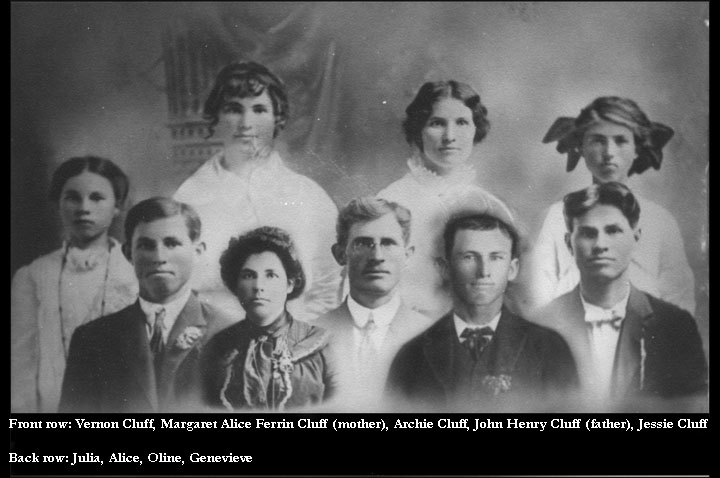
Grandpa and Grandma Cluff had moved from Utah to Pima to help settle the Gila Valley. Father
was born in Pima, Arizona on April 16, 1890, the third child in a family of ten. The two older children
died as infants leaving Father as the oldest child of John Henry Cluff and Margaret Alice Ferrin. Father's
mother died in childbirth in 1904, and since he was the oldest surviving child, he had to assume a major
role in caring for younger brothers and sisters, except for the youngest two who were taken to live with
relatives. There is no record that Father had a patriarchal blessing.
Father attended Gila Academy in Thatcher, Arizona, which was a preparatory school equivalent toa four year high school. Lonnie Montierth relates that he could remember Father breaking broncos for
people. He would saddle one of these broncos in the morning and ride it to school. When school was out
he would ride it home again. Each day as he started to mount his horse to ride home there would be a
crowd around just to see the show, and to see if the horse would buck. The horse seldom let them down.
Father must have been a pretty good rider and trainer.
Father said that at one time he thought that he wanted to be a tough guy and smoke because of a
lady teacher he had. She had a profound influence on him but this didn't last long.
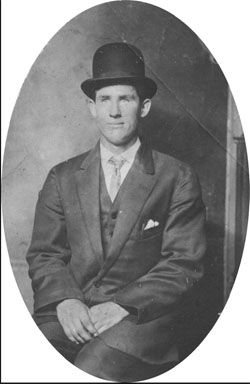
When Father arrived at the age missionaries
were called, he heeded the call to Northern States
Mission. An interesting thing happened when his
grandson, Archie (son of Cloard and Elsie) received
his call. It was to the Northern States Mission also.
When it was announced where young Archie was
being sent, a lady at church commented that she
remembered when another Archie Cluff received his
call to that mission. Father's sister, Aunt Olive Talley,
said she remembered when Father received his call.
He used to go out behind trees and practice preaching.
|
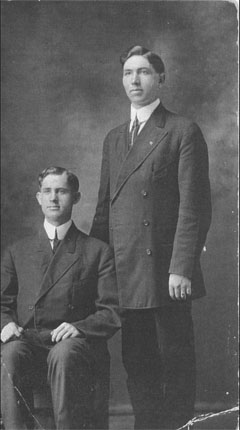
Archie and companion
|
How lonely he must have felt while he was in the
mission field. Mothers are the ones that usually do the writing and see that their sons have the finances
that they need to support themselves while on their missions.
Father told of one event that happened while tracking from house to house. At one house they
knocked on the door and the man of the house, when they told him who they were, told them, in
somewhat questionable language, to get out. As they walked towards the gate, that good old Michigan
mud got so heavy on Father's shoes that he kicked the gate post to jar the mud loose. Immediately the
door swung open. After an exclamation the man said, “Don't kick the dirt off from your shoes on my gate
post. Get back into this house.” The man was later baptized.
Father told of going through the Kellogg corn flake plant on a tour. At one point the guide suggested that they might want to taste the corn flakes. They did and it stuck to the roof of their mouths.
On November 4, 1912 he wrote on the back of a picture post card of himself and his companion, an Elder
B.M. Thompson, “After a summer walking nearly around the state of Michigan doing Missionary work
we covered between fourteen and sixteen hundred miles on foot.”
Father returned from his mission to live with his father on a ranch not far from town (Pima). A
story was told on Dad at about that time. He was very careful to get to town to church meetings,
especially priesthood and sacrament
meeting. One Sunday morning he didn't come in to services. Family and friends worried about him.
Some even wondered if they should go out to see if anything was wrong since he was always so prompt.
However, on Monday morning he appeared bright and early in his Sunday cloths, driving his team and
buggy. He had worked all day Sunday and come in to church on Monday.
Father had returned home from his mission just shortly after Mother and her family had moved to
Pima. It was in Pima that Father and Mother met. He was good looking and considered, by many, to be
the best catch around. Mother recounts their courtship as follows:
| |
When I was 19 I started going with Archie Cluff. I rather liked him but as time went
on another boy seemed to come into my life. I thought I might have more fun with the other
fellow and decided I'd make the change. When my plans were all made I met my father on
the street between town and home. He stopped me and asked, “Well daughter, how are you
and Archie getting along?” I answered, “Oh! not too well, I think I'll quit going with him.”
Father looked me in the eye with a very grave look and said, “Be careful daughter, think well
and be sure of what you are doing.” He then patted my shoulder and went on. It gave me a
rather vague feeling of unrest but I soon passed it out of my mind. A day or two later there
was to be a party at the home of one of the girls. I went with Archie but decided this would
be the last time. I would tell him not to come again. I was expecting an old friend and suitor,
coming to spend the week with my bother and me. I could use that as my excuse. When we
came home from the party and he asked if he could come again Wednesday night (this was
Monday night) I answered, “Yes.” I had every intention of saying no. It seemed I was forced
to say yes. It gave me such a queer feeling as if some other power had a hand in it. I started
to undress for bed but had a very great desire to go outside, away from the house to pray.
This desire, I know, was prompted by some unseen force for never had I ever felt it necessary
to pray except by my bedside. I had always prayed for God to be my guide in all things. I
did go outside, down in the back of the lot, after midnight and knelt in prayer asking my
Father in Heaven for help, saying, if Archie was to be my companion, let me know and give
me a love for him, if not, help me to give him up. I went back to the house feeling the same
as before, I started to undress but was moved again with the same desire or influence to go
back to the mesquite bush back of the lot and pray again. I prayed harder and longer this
time but got up feeling somehow the Lord would answer me but not feeling any different
than before. I entered my bedroom where I undressed, then feeling the same influence as
before, I dressed myself and for the third time went back to the same place and knelt again in
humble prayer. Desiring to make no mistakes and asking that all would be well and as it
should be. As I finished my prayer a feeling of satisfaction came over me. It was a feeling of
great joy and a desire to see Archie, and a knowledge that someday we would be husband and
wife for time and for all eternity. I went to bed but only to think and dream of the future. I
thought, “It might be Archie will find some other girl and even marry her first, but if he does
I'll wait because someday he will be mine and I'll be his.” I didn't tell him this until after we
were married, but I was so deeply in love with him from that night on that I could hardly wait
from one date until another. This was in July. We were married in October, in the Salt Lake
Temple. As we were married by Alvin Smith and went to leave the marriage room Elder Smith came to congratulate us. He placed one hand on my shoulder and one on Father's and
said, “God bless you two. You were meant for each other before you came here.” And so I
was led through prayer to marry the man who was to be my husband for time and eternity.
My husband and your father. We were married, we were happy, and our plans and hopes
were high. |
Father and mother, along with Father's cousin and her fiancée, traveled by train from Pima to Salt
Lake City to be married in the Salt Lake Temple. They were married legally in Pima but did not consider
themselves husband and wife until after their temple ceremony. They were married on Oct. 2, 1914.
Mother and Father returned to homestead their ranch
property near Pima. It was located on the old Cluff road. The
present air strip is on what was John Cluff's (Grandpa's) homestead
and Father's homestead was just south of there on the west side of
the highway. The house was on the south side of the property with
barns and corrals between the house and the road. Johnny's pond
(as it was called) was on the north edge of Father's property. There
is still evidence of the pond which collected water from Mud
Hollow. When the CCCs were in existence, they rebuilt the dike.
Since then a hole has developed in the dike and flood waters have
washed through it.
Cloard came to us a very sweet, gentle baby. His little
feelings were easily hurt if we spoke sharply to him but he needed
very little correction. He was a good child with blue eyes and
curly, blond hair.
Cloard was born while the folks were living on the
homestead. He remembers, as a toddler, a big collie dog that they
had. It would not let him go off the place or near where men were
working with three horse teams and scrapers.
At one time Father worked on the flume that was built on
Mt. Graham. It extended from the old mill below Columbine to
just below Blackberry patch. The flume was used to send logs
|
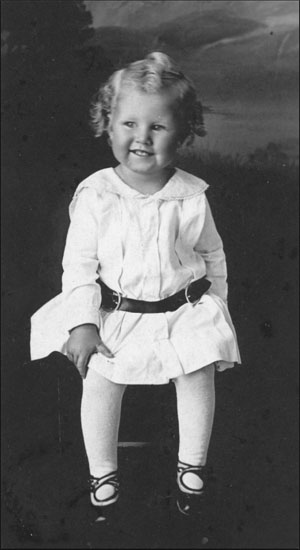 |
down the mountain. One man was killed trying to ride the flume down. The folks lived at Lone Pine
which was located at the base of the mountains at this time. Mother used to bath Cloard in the flume.
Father had a sheep and goat ranch towards Morenci for a while. On one occasion someone asked
Cloard where he got his curls. He responded, “From the goats.” The ranch was located some distance
from town and was not an easy trip in by horseback or buggy for groceries or other necessities. it was
here that Mother miscarried with her second pregnancy. Father was away and Mother bled profusely.
She tried to get Grandfather Cluff to go get help, but he refused, not realizing there was any emergency.
Mother was truly afraid she was going to bleed to death. She put a chair in front of the door to keep
Cloard from going out doors and she stayed in bed until Father came home. As soon as Father returned
home, he administered to Mother and she stopped bleeding. He buried the tiny fetus in the back yard.
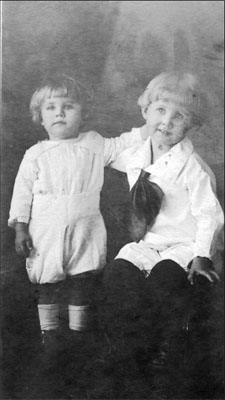
Leath and Cloard |
Then came Leath, another beautiful baby. Leath was very loving
and seemed to cling more to me than Cloard, but had more spunk
and determination to get what he wanted.
Then our first girl was Vesta. She was sweet and gently and
a little timid. At this time we moved to the old Cluff home in Pima
and decided to make it our home in the summer of 1920.
Vesta was born in Mexico. Mother and Father had
traveled to the colonies to visit
Mother's parents who had
returned to Mexico earlier.
They traveled by train to either
Casas Grandes or to Pearson
and on up to Colonia Garcia by
wagon. Vesta was born in the
house belonging to Grandpa
Nielsen. (All the girls of the
family were born there, in the
same bedroom, but none of the
boys were.) Soon after Vesta
was born they returned again to
Pima.
While living in the Cluff
home in Pima, I was busy |
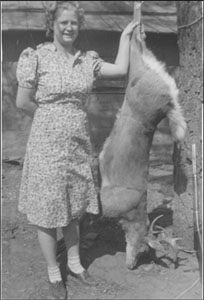 |
|
| |
with the home work one day. I had the baby, Vesta, sitting in her high chair by the end of the table as I was working a pan of butter. Leath had gone to sleep on a pillow on the front room floor and Cloard was standing next to the high chair interested in what I was doing when a sudden thought came to me to move quickly, the lightening was going to strike where we were standing. I grabbed the pan of butter then set it back down thinking to myself, “What a
foolish idea, it isn't even storming.” A few clouds were appearing but the sun was shining. As I set the pan down with that thought in mind it seemed I was literally shaken within and felt I must move and move quickly. I grabbed the high chair, said to Cloard, “Run into the kitchen quickly.” My voice startled him and he ran without any question. I set the baby and high chair in the kitchen, (we had been in the dining room). I ran quickly to the front room, picked Leath up, pillow and all, and ran to the front kitchen. I stooped over laying him on the kitchen floor when the lighting struck. It hit the top of the house, came through the ceiling just above where Leath had been, sent splinters of boards all over the floor and went through the door between the front room and dining room directly over the table where we three had
been and passed up through a screen door of the dining room. Cloard was five years old. He was standing in the back of the kitchen where he had a view of the door and table where we had been and he said, “Oh Mother, it was a big ball of fire and it went like that (waving his little arms in a zigzag motion).” You can imagine how I felt, so happy and so grateful that all our lives had been saved, when without the unseen power we would all have been taken in
just one second. I took Cloard in my arms and together we knelt and thanked God with all our hearts for His blessings. Archie came home late in the day and rejoiced with us.
Dale, our next baby came and we then moved to
Mexico. Dale was a sick baby from birth until he was 3 or 4
years old and was constantly in my arms. We didn't get to
enjoy his baby ways as we had the other children. |
It was in 1922, when Dale was the baby, that the family
moved to Mexico. Father went in with two wagons and three teams.
The front wagon was loaded with household goods and the family:
Mother, Cloard, Leath, Vesta, Dale, and of course Father. The
second was loaded with farm machinery. The two wagons were
hooked together with the three teams pulling them. They arrived at
Garcia in the middle of September after school had started.
A saddle horse which Father led down behind his wagons
learned to pull back until she would break the rope. They finally
had to put a chain around her neck and lead her. She hung back so
much that she
injured her neck
and went blind. |
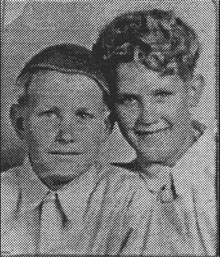 |
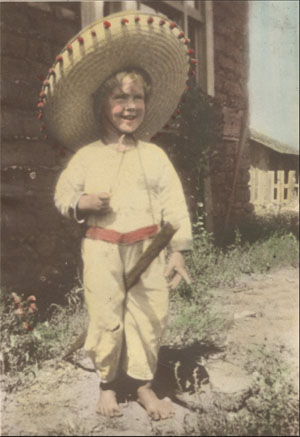
Ferrin |
When going up the dug-way out of
Colonia Juarez she reared back in one of her tantrums
and fell over on her side. She rolled off into a gully on
her back. In order to get her out, Father had to unhook
the lead team, hook on to her head and roll her end over
end to get her on her feet. He then had to lead her down
the gully to get her back up to the road. Cloard was 7
years old and was not sure if he was a help or a
hindrance. After they got to Garcia, Dad let Grandpa
Nielsen have the mare to raise colts. He traded the
wagons and machinery and three teams of horses for
part interest in the saw mill.
Father made another trip back to Pima. He sold his
ranch and drove the sheep from it to Mexico. It was
slow traveling because sheep just naturally travel slowly
plus they feed as they travel. This trip was made in the
summer and Father's brother, Uncle Jessie was with
Father. Father sold the sheep to mother's brother-inlaw,
Uncle Lester.
| |
Ferrin came when Dale was 22 months
old so I had two babies harder to tend than
twins, I believe. Ferrin didn't get the
tending or attention he needed. He was a
big child. At the age of 4, he was the bigger
of the two babies and always stayed the
bigger. Dale was never very big but he was a man in his judgment and dependability. |
|
|
|
His chores were always done and done well. Ferrin was of a different type. He was large of
body and grew almost too fast. In some ways his mind grew with his body. He seemed to feel he was bigger than Dale and resented the fact that Dale was the older. Dale never cared to really dress up nor put on a show while Ferrin, as soon as he could toddle around, wanted to wear his fathers ties and hat. He begged for a saddle, chaps, spurs, and a horse of his own. He needed spending money, wanted and longed for admiration. He didn't take the interest in
work that the other boys did. Maybe because he was growing so fast he was hard for me to
understand and manage. Yet he was loving and never seemed to get angry at anything I
scolded him for. He was taken from me at the age of 18. I sometimes wonder if it was
because I didn't understand him and wasn't able to help him that he was taken to be with his
father.
Then came Ora Lee, very much like her father
in looks and actions but one characteristic she has
very different from his. In that way she was like me.
She can't stand disappointment nor defeat. It just
hurts all over. We still feel that we should be right or
it should go our way. When Ora Lee was a baby I was
sick and seemed for a while I might not get well. I
was bothered with a bad goiter. My vitality went
down. My resistance was low and for a while I guess
I even wondered if God did always answer prayers or
if we just got better from some natural cause whether
we were administered to or not. One day I took very
sick. When Father came home I was in great distress.
I had done everything but send for the Elders because
we had no doctors. I had a terrible pain in the pit of
my stomach and I was in bed. Father came home after
riding the range all day. He was tired and had all his
chores to do which took a couple of hours. |
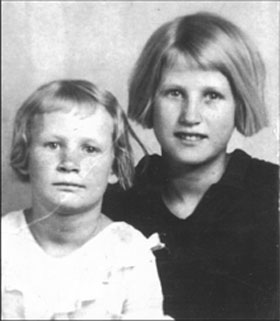
Margaret and Ora Lee |
By the
time he came in I was frantic. I think, still wondering
if I should, if my faith was great enough or if I might
have offended God, I ask for Bert Whetten, a man I had great faith in. He came and Archie
anointed me while Bishop Whetten sealed the anointing. While his hands were on my head
and as he rebuked the disease I felt a large lump break in three pieces and slowly pass
through my intestines one after the other. I was immediately relieved of all pain. I was weak
and tired but able to go to sleep and rest. I believe this sickness was given me to show me
that God did hear and answer our prayers. Shortly after this I was able to go to a Doctor and
received help for my goiter and became quite well and strong again. |
The family was living in Garcia when Mother developed her goiter. It became quite large
and someone suggested that she receive treatments for it from a chiropractor in Colonia Juarez.
Mother went down to Juarez in the late summer and stayed with her sister, Aunt Florence Wood, for
a few weeks for treatments. She missed her family so much and feeling that she was somewhat
better, returned home to Garcia. She enjoyed the apples that were just ripening in Juarez so much
that she almost lived on them while she was there. When her goiter was removed some years later
it was discovered that it had been nearly dead at one time but the roots had grown again with one of
them growing clear up behind her ear and another out her shoulder. It was later discovered that the
pectin in apples was effective in preventing goiters.
|
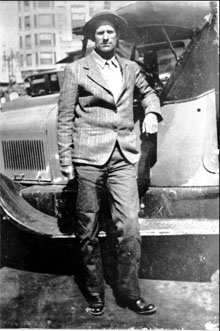
Archie Cluff - Missionary |
|
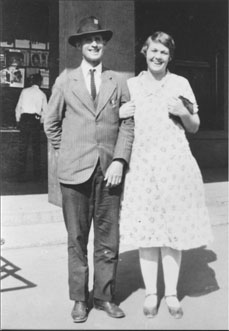
Archie and sister |
In 1928 Father was called to serve a 6 month mission in California. We thought at the
time maybe I might not even have any more babies but after the call came I found I was to
have another baby. I didn't tell father thinking it would be harder for him to leave if he knew.
I wrote and told him after he had been
in the mission field a couple of months.
He was still in the mission field when
Margaret was born. He got home
Saturday before fast day, the first
Sunday in June and blessed his baby.
As I longed for Father while he was
away I believe Margaret longed for and
needed a lot of love. We all do that but
Margaret couldn't have thrived without
that affection.
|
An interesting side note happened to Leath in about 1943. He was in the navy stationed at
Oakland, California. He went to one of the wards there for church. When he introduced himself as Leath
Cluff the Bishop asked him if he knew an Archie Cluff. Leath said that he was his father. The Bishop
called his parents over and on introducing Leath to them stated “This is the son of the man who converted
us to the gospel.” He told Leath that Father never knew he had converted them but that he was
responsible.
While Dad was on his mission, Cloard said he felt he was the man of the family doing a man's
job. He was 13 years old. He tried to plow our field and it seemed like it was taking him forever. He
only plowed it part way when the town people came out and finished plowing it for him. It only took
them a day. It was done with a team of horses and a walking plow. Mother ran a commissary for the
lumber company at that time. The workers received for their pay a work receipt which they traded for
groceries and clothes. Ora Lee was the baby and really missed her father while he was away.
The family was living in Mexico when Father owned a car. It is quite possible he brought it back
with him when he came off his mission. It was a new Model T Ford. He sold the car to Earl Farnsworth
because it was not really practical to have a car where we lived in Mexico. The road conditions were
very poor and fuel was hard to get plus tires and other things were hard to come by. By trading the car,
he got a horse called Old Blue, some cattle and it is possible that is when he got the ten acre farm just
west of Grandfather Nielsen's home where we later lived.
Mother's sister and her husband, Aunt Sine and Uncle Lester owned two houses in Garcia. They
decided to move out of town so sold one of the houses to Father and a Brother Lewis bought the other
one. The two houses were on one large lot with a low picket fence between them. At the back of the lot,
setting a little on both properties was a storage shed. Uncle Lester told Father that the shed wasn't worth
much and that he could have it. Months went by and one morning Father decided he would tear the shed
down, perhaps to use the materials for something else. Mother had taken Ora Lee by the hand and had
walked down with him. Shortly after he started, Bro. Lewis came down claiming the building was his
and accused Father of stealing it. Father said the building was his and continued to tear it down. Mr.
Lewis became so angry that he grabbed a doll from Ora Lee and slammed it to the ground and stalked off.
About an hour later a man came and said the Bishop wanted to see Father. Would he meet him at the
general store. When Father arrived Brother Lewis was there, again accusing Dad of stealing his building.
Father assured them that the building was his. The Bishop asked Father to write to Uncle Lester and get
confirmation of that fact. Father wrote to Uncle Lester and did nothing more about the building until he
received a reply and confirmation that the building was in fact his. In anger Brother Lewis demanded
that Father nail up the gate that was between the two houses. A few days later Father went out to nail the
gate shut. While he was still working on the gate he was again summoned to meet the Bishopric. This
time Brother Lewis accused him of stealing the nails and hinges from the gate. Father assured them he
was only doing what Brother Lewis had ordered him to do. Brother Lewis became so enraged that he
sprung at Father.
It took the members of the Bishopric to restrain
him. Then Brother Lewis demanded that Father apologize to
him. Father did. When he returned home and told Mother about
it she was annoyed and exclaimed, “You apologized to that man,
after all the trouble he has been?” Mother said Father just looked
at her and said, “That man must be the most unhappy man alive.
If my apology can give him just one little bit of happiness, I'd be
glad to do it again.”
Leath recalled that on one occasion he heard a man start
to comment to Uncle Ernest (Mother's brother) something about
what a softy and foolish man Father was. Uncle Ernest turned on
him quickly stating, “I don't want to hear another thing about
Archie. He is a better man than you and I put together!”
| |
Then came Edith. She has been a very dutiful
child, very conscientious and worked hard for a worthy
praise. Her one big desire has been a home of her own but
she has been able to go on getting what she could in life to
improve herself while waiting for her mate. |
|
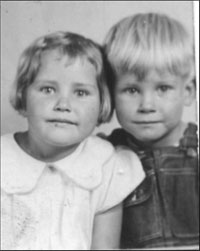
Edith and Val |
| |
When Edith was small the relief society President came to me in Garcia and asked me
to take the theology lessons, teaching a course in Book of Mormon. I had never taught
anyone but small children. I liked teaching small children but to teach adults, I just simply
felt I could not. I told her I could not do it for her, to get someone else. I would work with
children but not adults, as I felt their time would be wasted. I could give them nothing. After
talking a long time she said, “Well you just tell me of another woman in this town that we can
get to do it and I'll ask the Bishop for her.” I began to think but was like her, I could think of
no one. I said, “Well I won't promise but I'll still try to find someone and I'll prepare this one
lesson so you will see I can't do it.” She left and I went to work. First on my knees asking
God to either help us find a teacher or else make a teacher out of me. Then I started studying.
I read and thought and studied constantly for the next few days. I went to Relief Society on
Tuesday, a very frightened but humble woman. After the meeting all the members came up
to me and told me how much they had enjoyed the lesson, that I was a natural teacher. They
didn't know that God had just given me that ability because there was a great need for it and I
was willing to do my part. I was then put in as teacher of adult Sunday School class and later
mutual class. I believe and I love that passage from Nephi, “God never asks anything of us
unless He will prepare and help us to fulfill it if we try.”
About this time was the happening of the little incident of our tithing. Times were
hard. It came tithing settlement. We owed 10 pesos to finish our years tithing. We had just
10 pesos but we were out of flour. There was none to get in town. One of the men in town
was going to the valley 40 miles away in a wagon, a four day trip. He would bring us back a
sack of flour, which cost 10 pesos. Father came in the house and told me this man was going
and what should we do, pay the tithing or send for the flour and let the tithing go? We
decided to pay the tithing. So he took the 10 pesos and went up to the Bishop's. There were
three or four men sitting there waiting to settle their tithing. As father walked in, John
Bingham, one of the men sitting there, who had owed us 25 pesos for several years, said,
“Archie I owe you 25 pesos. Sorry I haven't paid it before, but here it is.” That was a debt we
had wiped out of our minds as one never to be paid. I am just as sure as anything that if he
hadn't gone to the Bishop's office that morning with that 10 pesos to pay tithing, that 25 peso
debt would never have been paid. Father felt the same about it.
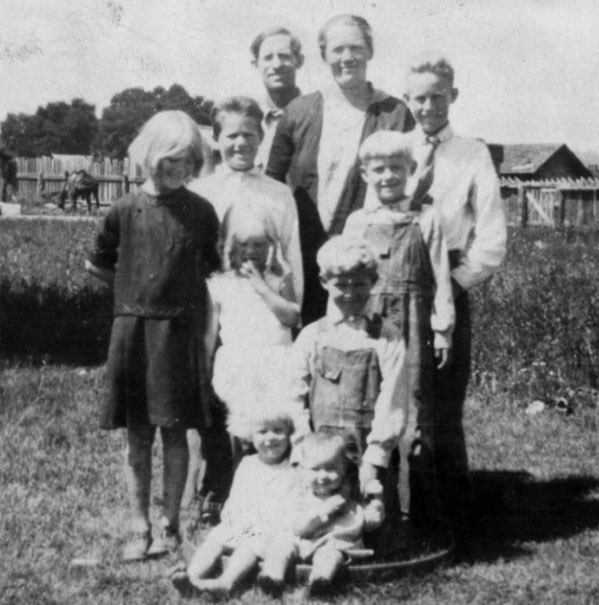
Vesta, Leath, Archie, Vennus, Cloard, Dale, Ferrin, Edith, Margaret, Ora Lee
(Clockwise from left) |
The fact that Father was a kind and gentle man does not mean that he would not discipline his
children if and when the occasion warranted it. Dale remembers getting a spanking when he was thirteen
years of age. He went with his cousin, Keith Farnsworth to bring in Uncle Ernest Farnsworth's horses.
They found the horses and started home but met some boys who were playing. They decided to stay and
play and let the horses go home by themselves. It was dark before Dale and Keith got home. When
Father asked where he had been Dale told him they were looking for horses. Sensing that this was not
the truth, Father sent Dale out to get a stick. Dale got the smallest stick he could find figuring that any
spanking he would receive with it would not hurt. The lie was bad enough but the stick compounded the
situation. Father went after a rope with which he gave Dale a good sound spanking. Ora Lee recalls the
only spanking she ever got. Father planted peanuts one year. He saved the best peanuts of that harvest
for seed to plant the next year. When it got to be planting time the peanuts were set out. For some reason
Father and Mother left the kids at home and went to town. The kids only meant to taste the nuts but they
were really good and they had eaten quite a few before the folks returned. Father asked who had eaten
the peanuts and, to make bad matters worse, they all denied their part in the escapade. Father sent
someone after a willow and used it on all guilty persons, not so much for eating the peanuts he told them
as for fibbing about it afterward.
While still living in Garcia, Father was interviewed to be a Seventy. At this time he was getting
ready to go to a Stake conference to be held in Juarez. Half way down the mountains he met the Stake
President who interviewed him to be a Counselor to the Bishop in Garcia. He had left early for
Conference because he had produce to sell. At conference he was ordained a high priest. He wasn't at
the meeting when he was sustained as Counselor. He had not yet returned from Juarez. Dad served as
Counselor to the Bishop twice while living in Garcia. Even though Dad was never ordained a seventy, he
always supported them. Once the Seventies had a project where they each donated a heifer. When Dad
found out he immediately rounded up a two year old heifer and gave it to them. He was always willing to
carry his share of the load and we always made it some how. Father also served as Sunday School
superintendent for a while.
Mother served as Primary President twice while living in Garcia. Her first calling was on
September 14, 1922 with Maud Farnsworth and Nora Farnsworth as counselors. They were released on
Nov. 15, 1931. She was president again on Nov. 7, 1932 and released on November 7, 1933 because the
family moved to Juarez. Pauline Beecroft and Maud Farnsworth were her counselors at that time.
Mother served as president again in Juarez and received a pin for 30 years of service in the primary. She
actually served in that organization over 35 years.
Father was called on often to substitute as chorister. He never could lead with his hand but
always had to have a pencil or baton in his hand. Father had a beautiful tenor voice. He also had a great
ability to whistle. It was recognized all over town. When he whistled for his kids, they knew it was time
to go home. One evening at a church social a group sang the song “Listen to the Mocking Bird”. Father
stood off stage and whistled the sounds of a mocking bird as the group sang.
There was another side of Father that was very interesting. He played the harmonica. He had a
framework that fit over his shoulder that held the harmonica up. With this contraption he was able to
play the organ at the same time he was playing the harmonica. He could also put one end of the
harmonica in his mouth while he played the organ and harmonica together. This combination was strictly
for entertainment and played only at home. He played by note and by ear. He did play the harmonica for
entertainment and he would play it for dances. Once he laid his harmonica down on the piano for a break
and when he returned it was gone. That ended his part of the music for that night. The people were up in
arms over this.
Father was rather famous for his sneezes. It was jokingly stated that he could be heard all over
town. One evening the M.I.A. put on skits. One girl came on stage pretending to be Aunt Hattie Farnsworth calling her kids. Aunt Hattie could be heard all over the small town of Garcia when she
called her children. Next they had a boy come on loudly sneezing his head off. He was representing
Father. Everyone thought Father was going to be out of town that evening but he got back just in time to
see the plays and he really got a big kick out of them.
Father liked to participate in rodeo roping. He enjoyed playing baseball and played first base but
had a hard time with baseball because his ankles turned so easily. He either wore boots or high topped
shoes, which he kept laced up tight around his ankles.
Father worked at the saw mill running the planer and edger for a while but eventually traded his
interest in the saw mill for part interest in the Gavilan Ranch located five miles west of Garcia. Mother's
brother, Uncle Ernest Nielsen and Uncle Ernest Farnsworth, Mother's brother-in-law, owned part of the
ranch. Father built a house, corrals, barn, and fenced in the farm land and farmed. The land was very
fertile and produced potatoes, cabbage, squash plus a lot of corn and other vegetables. There was a creek
that ran continually from which we irrigated. later we traded E. Farnsworth out of his interest in the
ranch.
Father also was part owner of the cheese factory in Garcia but usually hired someone else to run
it. Mainly he helped promote it. Eventually he sold his interest in it. Father and the boys milked range
cows in the summer, night and morning. They took the milk to the cheesery to be made into cheese.
They usually had enough cheese for their own use plus some to freight down to Casas Grandes to sell. In
the fall of the year they made butter from the cream they skimmed off the milk. The cream was put in a
big five gallon metal honey can with a wooden lid and a wooden dasher that had to be pulled and pushed
up and down till butter was ready. Mother put the butter in five gallon cans and filled them with brine to
preserve the butter for winter use.
While driving cattle from Garcia to Pearson to be shipped to the States, Father was bitten by a
skunk. Father and Roy Farnsworth had worked the first half of the night guarding the cattle. They came
in late to bed down. Father dreamed that a parrot flew down from a tree and grabbed him by the nose.
He woke up enough to throw whatever it was that had bit him off the bed roll but it came back. He tried
to kick it off again. The commotion awoke Roy, who was sleeping next to him. They felt something
coming back again. Roy picked up a stick and as it came up this time, Dad struck a match and Roy hit
the skunk across the back, killing it. The skunk didn't even stink. When they got to Pearson, they
shipped the cattle to El Paso, Texas and Dad rode the train out with them. By the time the cattle were
taken care of and Dad could get to a Doctor, the skunk he had carried with him was so badly decomposed
that they could not tell whether it was rabid or not. Father took treatments and because so much time had
elapsed between the time of the bite and treatments, they gave him a double dose, one shot in the
morning and another in the evening. These shots were given in the stomach at about the belt line and
were extremely painful.
After the folks bought the Gavilan ranch the family spent the summers on the ranch and winters in
town. One summer they had a large reunion at Docs. Headquarters as it was called. [A nice camping
area about a mile up the creek from the ranch house.] Some of our relatives from the United States and
also many persons from Garcia were there. It was really a fun get-together. The men hung a swing from
a branch of a tall pine tree. The swing was very high. By taking a long rope and extending it over the lap
of the person or persons sitting in the swing, and by a person holding onto each end of the rope, they
could pull on the rope and swing the person in the swing very high into the air. One night Mother had a
dream about the swing. She said no one should swing in it because it was very dangerous, that someone
was going to get hurt. She was quite insistent but the men checked the ropes, the knots, and the limb
from which the swing hung and assured her that the swing was safe. Mother kept worrying about it all
day but the swing was used. In the evening, Margie Farnsworth was being swung. She passed out and
consequently let go of the rope. She was knocked unconscious as she was flung several yards backward from the swing. Some of the men administered to her. She recovered without ill effects.
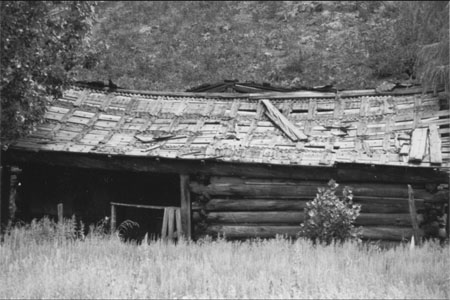
Ranch house 1980
Hunters often came from the United States to hunt on the ranch. Hunting was very good and
Mexico had very few laws regarding hunting, and even these were never enforced. In about 1938, the
ranch was sold to Burt Farnsworth (a cousin) to be used to take hunters on but Burt was unable to make
payments so the ranch was reclaimed after a very short time. We were allowed to do what hunting we
wanted to on our own property. Father always carried his rifle with him as he worked and killed meat
whenever it was needed at home. He loved to hunt turkey. He would go out early in the morning in the
spring, call the turkeys to him by using a turkey caller made from the wing bone of a turkey, shoot one
and bring it home. One time when he was hunting turkey he got two gobblers on the call. One was much
closer than the other. The closest one fooled around and waited for the other one to catch up to him.
Father patiently waited and called. When they came over the hill where he could see them, there was a
whole flock with them. He watched his chance and when they got in line, he pulled the trigger on his
little 32-20 rifle and killed three with one shot.
Trout fishing was also excellent sport at the ranch. Some of the relatives came to visit one time.
Mother and Father took them fishing. They caught plenty of fish which the ladies fixed for dinner. One
lady really enjoyed the fish. After her plate was covered with fish bones she started slipping the bones
over on to Father's plate. Father never really cared for fish.
Leath recalls one time when he and Father were riding out on the north end of what was called the
Blue mountain. The mountain was so steep that they had gotten down from their horses and were making
their way down the slope on foot. Father suddenly stopped and pointed down the hillside to where a bear
was standing. Father debated whether to try to kill the bear or not. Again he was carrying his 32-20
which is a small rifle. He decided to shoot. He hit the bear in the shoulder. As the bear dropped down,
Father shot it again in the head. They skinned the bear but had a terrible time getting the hide onto the
back of the saddle horse. The horse didn't like the idea and bucked in protest. They did eventually get
home with it. Father had the hide tanned. It was used as a rug on the living room floor until a hunter saw
it and talked Father into selling it to him.
|














 Ferrin
Ferrin




